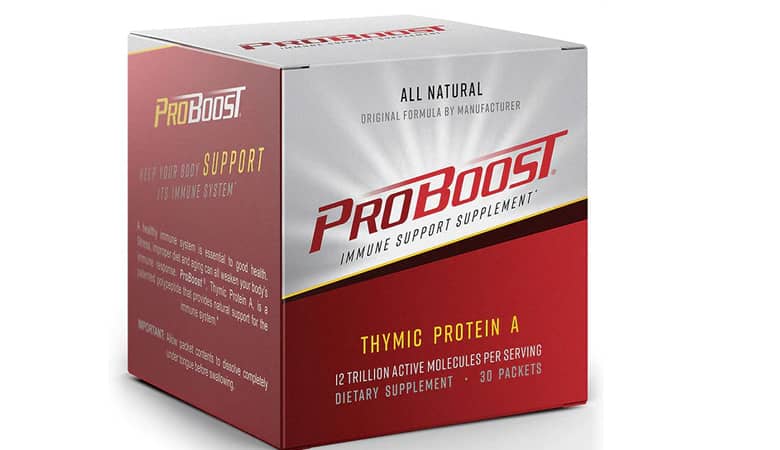
Thymic protein A (TPA) is a type of thymic protein found in human thymus tissue. It’s also known as thymic lectin, thymocyte-specific protein A, and CD205 antigen. It’s a small secreted protein that contains carbohydrate chains. These chains can be sugar moieties or sugar-modified amino acid residues.
TPA is found in most mammals and has several functions. In humans, it aids in the maturation of T cells, a type of white blood cell that plays a vital role in the immune system.
This article explains everything you need to know about Proboost Thymic Protein A, including its structure, functions, production, clinical significance, and more.
What Is The Structure Of Thymic Protein A?
Thymic protein A is a glycoprotein composed of a single chain of amino acids. Its structure includes a core protein, two carbohydrate chains, and a terminus.
The terminus of the protein is made up of lysine and arginine residues, while the protein contains 37 amino acids, two of which are cysteines linked by a disulfide bridge.
Its carbohydrate chains are composed of galactose, mannose, and N-acetylgalactosamine. The core protein is a cystine knot that contains two cysteines.
The chains are branched, and the core protein is attached to the ends of the chains. The amino acid sequences of these chains might differ but are both linked by covalent bonds between the carbonyl groups of the carbohydrate chains and amino groups on the polypeptide chain.
Note that proboost thymic protein A has a molecular weight of approximately 16 kDa, where the carbohydrate portion of TpA makes up 90% of the molecule’s mass, and the core protein portion consists mostly of amino acids arginine and lysine.
What Does Thymic Protein A Do?
Thymic protein A is mainly produced in the thymus organ but can also be found in small amounts in the lymphoid organs, lymph nodes, and spleen cells.
Thymic protein is basically involved in the maturation of T cells, which are a type of white blood cell that plays an important role in the immune system. It also helps to induce the differentiation of B cells, which are white blood cells that produce antibodies.
TPA and thymic stromal lymphopoietin (TSLP) is known as differentiation factors and help in the maturation of T cells by promoting the expression of surface proteins.
When cells are first formed in the thymus, they’re immature and can’t be used to fight infections in the body. They have to go through a maturation process before they’re helpful. They do this by collecting antigens from the body’s fluids through their cell surface proteins.
After the antigens have been collected, the immature cells die and are replaced by mature immune cells ready to fight infections.
Thymic Protein A also helps T cells to bind to thymic epithelial cells. This is done by activating a pathway that leads to the production of cytosolic calcium. The calcium promotes the binding of the T cells to thymic epithelial cells.
TPA also has antimicrobial and immunomodulatory properties. It can prevent the growth of bacteria in the blood and on the surface of the skin.
Last but not least, TPA has been shown to help regulate the growth and development of lymphoid progenitor cells, which are precursors to more mature blood cell types such as T-cells and B-cells.
TPA Gene Mutation and Inheritance
The thymic protein A (TPA) gene is found on chromosome 17. This gene contains two exons and is about 1,300 base pairs long. This gene is also known as CD205A, and it’s been found that there are significant variations in its structure between different ethnic groups.
There is a single TPA gene mutation that has been found in humans. This mutation occurs in the exon one region and causes a premature stop codon. This mutation is inherited in an autosomal recessive pattern. Individuals who have this mutation will have a dysfunctional thymic protein A.
How Is Thymic Protein A Measured?
One way to measure thymic protein A is by doing a blood test. In this test, a small amount of blood is taken from the patient. It’s then sent to a laboratory to be tested.
Other ways to measure thymic protein A in the blood include:
- ELISA assay – This assay measures the total thymic protein A in the blood.
- Western blot – This assay measures the amount of thymic protein A in the blood relative to the amount of total thymic protein.
- Immunofluorescence staining – This assay measures thymic protein A in the blood relative to the amount of total thymic protein and the amount of CD4+ T cells.
Clinical Significance Of Proboost Thymic Protein A
Thymic protein A is a biomarker of inflammation. It’s usually only produced in high amounts when the body is fighting an infection. It’s also used as a marker of liver damage since it’s found in high amounts in the liver.
TPA can be used as a marker for disease progression in certain cancers, such as non-Hodgkin lymphoma, Hodgkin lymphoma, and chronic myeloid leukemia. It can also be helpful in predicting prognosis.
It’s also used as a marker for graft-versus-host disease, a problem that occurs after an allogeneic transplant.
List of Diseases/Disorders Associated with Thymic Protein A
Autism: Autism is a disorder that causes issues with social interactions and communication, repetitive behaviors, and unusual responses to sensory input. A study has shown that thymic protein A may be able to treat autism by regulating the immune system.
Crohn’s Disease: Crohn’s disease is a type of inflammatory bowel disease that causes severe abdominal pain, diarrhea, and weight loss.
Cystic Fibrosis: Cystic Fibrosis is a genetic disease that causes thick mucus to build up in the lungs and the digestive system.
Dermatitis: Dermatitis is a joint inflammation that causes skin irritation and itching. It has been shown that thymic protein A can help treat dermatitis.
The Bottom Line: Side Effects Of Thymic Protein A
Like all drugs, thymic protein A has side effects and may cause allergic reactions in some people. Some people have found it makes them tired, others have experienced headaches, and some have experienced allergic reactions like swelling or a rash.
Thymic protein A can also lower sugar and calcium levels in the blood. This can cause side effects like muscle cramps, nerve problems, and muscle spasms. As such, people with low calcium or blood sugar in their blood levels should consult with a physician before taking thymic protein A.




